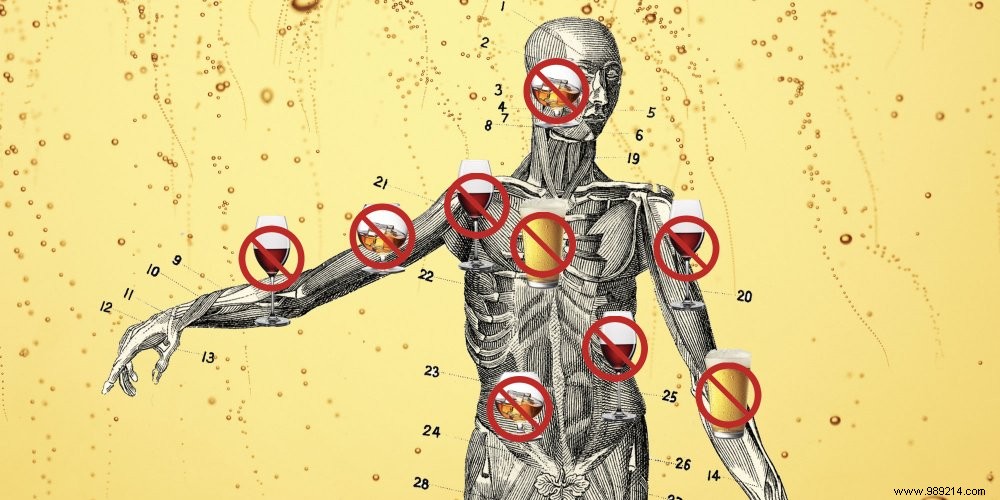 Quitting alcohol consumption is the top resolution made every year. If these never last very long, this decision nevertheless has countless health benefits.
Quitting alcohol consumption is the top resolution made every year. If these never last very long, this decision nevertheless has countless health benefits. "Our body is not designed to metabolize alcohol", notes Dr. Cyril Gauthier, nutritionist, member of the Scientific College of the Ramsay Health Foundation.
The calories provided in liquid form by wine, gin or vodka are therefore not used as a source of energy for the body's needs. Once absorbed, they are immediately transported to the liver which transforms them into toxic substances and fats. Drinking alcohol also disrupts many body functions, such as sleep.
Putting a stop to it therefore generates a noticeable improvement in the state of health and a rapid feeling of well-being .
For regular and excessive consumers, stopping alcohol can be difficult because the expected benefits are temporarily erased by withdrawal symptoms , more or less severe depending on the level of dependence.
The brain, suddenly lacking, produces less dopamine and serotonin, neuro-hormones associated with pleasure and well-being. Their sudden deficit induces nervousness and anxiety that can generate anxiety and temporary depression.
Insomnia, nausea, tremors and intense fatigue are also common, especially during the first 24 to 48 hours. But fortunately, these feelings of general malaise gradually fade and disappear after 7 to 10 days of abstinence.
In the event of severe addiction, it is better to be accompanied to get through this course more gently and reduce the risk of relapse*.
As soon as you stop drinking, the body goes into detox mode and the liver can start to blow .
Video of the day:After a few weeks without overloading, it gets rid of excessively stored fat, "which reduces hepatic steatosis, therefore the risk of fibrosis and cirrhosis of the liver", explains Dr. Gauthier. One month stop, on the occasion of the operation Dry January for example, is already favorable, even if not to resume at the end of this challenge is always better.
If alcohol is not replaced by an overconsumption of sodas or sweets, its deprivation induces a rapidly visible weight loss, especially at the abdominal level. One gram of alcohol delivers 7.1 Kcal, which is more than one gram of sugar (4 kcal)! Removing this energy bomb then reduces the risk of developing type 2 diabetes and cardiovascular disease.
Another major advantage:the risk of cancer is gradually decreasing (source:Ligue contre le Cancer). "From one drink a day, alcohol indeed promotes the occurrence of digestive cancers (intestinal, stomach, esophagus, etc.), throat and mouth, as well as breast cancer in women", recalls Cyril Gautier. Doing without it reduces this risk over the years.
Dealing with alcohol is very tiring for the body. Stopping it therefore causes a rapid reduction in fatigue . After two weeks, sleep already becomes more restful.
Falling asleep is not faster because the "mass" effect of alcohol has disappeared, but nocturnal awakenings are fewer and deep sleep of much better quality. Result:the body recovers more of its physical abilities during the night, the immune defenses are invigorated and the brain is better able to regenerate, which improves its capacities for reasoning, concentration and decision-making.
After a month,the skin also regains a better appearance . As alcohol is diuretic, it tends to dry out skin tissue. Once its consumption has stopped, the epidermis regains its natural elasticity and redness fades. The complexion then becomes more even and radiant.
*Alcohol Info service